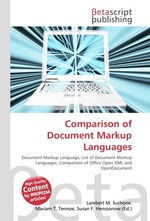Comparison of Document Markup Languages
Lambert M. Surhone, Mariam T. Tennoe, Susan F. Henssonow
бумажная книга
High Quality Content by WIKIPEDIA articles! The following tables compare general and technical information for a number of document markup languages. Please see the individual markup languages' articles for further information. A markup language is a modern system for annotating a text in a way that is syntactically distinguishable from that text. The idea and terminology evolved from the "marking up" of manuscripts, i.e. the revision instructions by editors, traditionally written with a blue pencil on authors' manuscripts. Examples are typesetting instructions such as those found in troff and LaTeX, and structural markers such as XML tags. Markup is typically omitted from the version of the text which is displayed for end-user consumption. Some markup languages, like HTML have presentation semantics, meaning their specification prescribes how the structured data is to be presented, but other markup languages, like XML, have no predefined semantics.
Данное издание не является оригинальным. Книга печатается по технологии принт-он-деманд после получения заказа.


